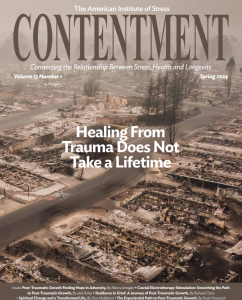Healing From Trauma Does Not Take a Lifetime
Contentment Magazine: Spring 2024
Volume 13, Number 1
Or Read the Articles Below

Editor’s Message
By Jeff Jernigan, PhD, BCPPC, FAIS
Post–Traumatic Growth Finding Hope in Adversity
By Nancy Jernigan, PhD, LPC, FAIS
Post-Traumatic Growth: Finding Hope in Adversity, the concept of Post-Traumatic Growth (PTG) and, in broad brush strokes, lays out what this is, how it works, and the hope it provides those who think there is no remedy for the stress, anxiety, and trauma injury they have experienced. Experiencing a traumatic event can transform someone’s life and facilitate growth. PTG rests on the
theory that healing comes through adversity and gives hope and renewed strength. This strength can often be more significant than before the event or experience. Nancy recommends a five-step self-care plan as a tool for sustaining and building resilience, enabling quicker recovery from stress and trauma injury
Cranial Electrotherapy Stimulation: Smoothing the Path to Post-Traumatic Growth
By Josh Briley, PhD, BCMAS, FAIS
Cranial Electrotherapy Stimulation: Smoothing the Path to Post-Traumatic Growth, offers hope for those struggling with recovery from stress and trauma injuries. What it means to “get better” is described practically as getting unstuck from mistaken beliefs and embracing a change in perspective that offers freedom from preconceived notions. The biology and psychology of PTG are explained, leading to an understanding of the neurological changes experienced as symptoms of post-traumatic stress. What we think and feel is demystified to the point where what to do about it becomes clear. Traditional means of managing post-traumatic stress are reviewed, and a modern approach to treatment is introduced: cranial electrotherapy stimulation (CES).
Resilience in Grief: A Journey of Post-Traumatic Growth
By Richard Citrin, PhD, MBA
Resilience in Grief: A Journey of Post-Traumatic Growth moves the reader into his lived experience with post-traumatic growth. Facing the loss of two adult children within five years, he details the complexities of grief and how he and his partner drew strength from each other, their work, and their community. Taking different paths, they created new ideas to share with their clients and the broader community, transforming the tragedy into new learnings for themselves and others. This is a poignant,
transparent, true story about loss, grief, and a search for answers. Their journey illustrates creative ways post-traumatic growth can be sustained, creating new resilience along the way.
Spiritual Change and A Transformed Life
By Don Middleton, DO
Resilience in Grief: A Journey of Post-Traumatic Growth, begins with his introduction of John sitting next to him in a 12-step program meeting. Only John was not his real name. Don has the privilege of becoming John’s sponsor and becomes part of John’s journey to sobriety. Don lays out how post-traumatic growth applies to failure in life and the consequences of addiction. Disease, including addiction, brings loss, anxiety, stress, and trauma into life in ways that require a process of recovery. Don describes recovery as a process and not a final destination.
The Experiential Path to Post-Traumatic Growth
By Frank Forencich, DAIS
The Experiential Path to Post-Traumatic Growth, takes us out of the specific personal details of PTG to the bigger picture of socialization and enculturation as human beings. His thoughtful piece reminds us of the wealth of knowledge we already possess about how the body processes stress and trauma, the wide range of bio-medical remedies available to us, and the anthropological need humans have to experientially determine through lived experience that the world is a friendly, manageable space.

Delayed Onset Post-Traumatic Stress
By Jeff Jernigan, PhD, LPC, BCPC, FAIS
Recovering from physical or moral injury is not a one-and-done event. It is a process of adding and extending benefits as we grow in understanding how our mind and body respond to stress and what we can do about it to amplify healing. This is true for childhood and adolescent anxiety and trauma, as well as adult and geriatric trauma. This article provides insight into healing, health, and hope post-traumatic growth can provide.
Editor In Chief
Daniel L. Kirsch, PhD, DAAPM, FAIS
AIS President
Editor
Daniel L. Kirsch, PhD, DAAPM, FAIS
Contributing Editors Board
Richard Citrin, PhD, MBA
Alex Bekker, MD, ABHIM, FAIS
Teena Evert, MA
Rozina Lakhani, MD, MPH
Ron Rubenzer, EdD, MA, MPH, MSE, FAIS
James C. Petersen, PhD, FAIS
Jacinta M. Jiménez, PsyD, BCC, FAIS
Managing Editor
Kathy Schoop
Creative Director
Michael McMahon
Daily Life and Workplace Stress Board
The role of this board is to develop initiatives and communications to serve the stress management needs of all people.
Josh Briley, PhD, FAIS, Science and Education Director, EPI, Inc., Former Clinical Psychologist, VA Community Based Outpatient Clinic, Brownwood, Texas
Heidi Hanna, PhD, FAIS, Brain Fitness Researcher, Instructor, Harvard Extension
William C. Heckman, MS, NBCT, DAIS, Board Certified Educator, Executive Director, The American Institute of Stress
Andrew Pleener, MD, FAIS, Psychiatrist, Founder of the #SameHere STARR & Psych Alliances
Sharon Montes, MD, FAIS, Founder, Living Well Whole Health, Former Medical Director for the University of Maryland Center for Integrative Medicine
Contentment Magazine
The mission of the nonprofit American Institute of Stress is to improve the health of our community and the world by setting the standard of excellence of stress management in education, research, clinical care and the workplace. Diverse and inclusive, AIS educates healthcare practitioners, scientists, and the public. AIS is the only Institute in America solely dedicated to providing information, training and techniques to prevent and reverse human disorders related to stress, and to improve the quality of life and increase longevity through building resilience to stress. Credentialed AIS members provide leadership to the world on stress related topics.
Subscribe to our FREE magazines and begin your journey to a happier, healthier, and longer life!
Contentment Magazine
The dictionary defines “content” as being in a state of peaceful happiness. The AIS magazine is called Contentment because we want all of our guests and members to find contentment in their lives by learning about stress management and finding what works best for each them. Stress is unavoidable, and comes in many shapes and sizes that makes being in a state of peaceful happiness seem like a very lofty goal. But happiness is easy to find once you are able to find ways to manage your stress and keep a healthy perspective when going though difficult times in life. You will always have stress, but stress does not always have you!
